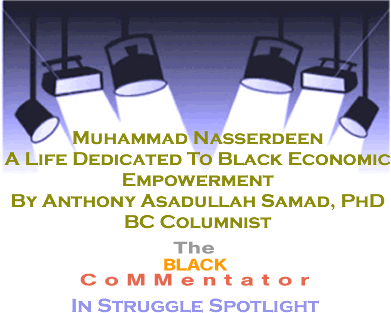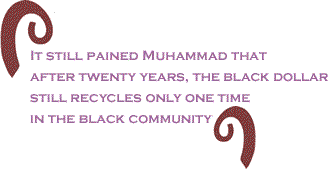
|
|||||||||||||||||||||
|
||||||||||
|
||||||||||
The current issue is always free to everyone If
you need the access available to a |
||||||||||
 |
||||||||||
 |
||||||||||
|
The founder of the most credible black economic empowerment movement in Los Angeles, and maybe the country, died last week. Muhammad Nasserdeen, President and Founder of Recycling Black Dollars (RBD), started a movement based on a very simple premise � putting the black dollar in another black hand � and for the last twenty years, advocated for the building of black businesses and black economies nationwide. At the young age of 54, the man who was unapologetic about educating black consumers on the benefits of dollars turning over in their own communities, and even redirecting black consumerism away from corporations and non-black owned businesses that did not respect the power of black patronage, left us at a time when economic subjugation is on the rise. African Americans are still the last hired (even in their own communities), first fired, and are paid less and charged more for the same (and sometimes, inferior) goods. The sub-prime lending crisis, studies revealing blacks being charged more interest on auto loans, and the payday check cashiers are just the most visible examples of how Blacks are subjugated economically. Muhammad was on his post, at his desk, at the time of his heart attack. He died with his boots on, dedicating his life to this movement. I met Muhammad in 1987 when I was heading a yearlong selective buying campaign called Buy Liberty, an effort to get Blacks to spend with their own instead of with interests that were not hiring them. Nationally, Tony Brown of Tony Brown�s Journal was advocating for Blacks nationwide to do the same thing. Brown articulated how white people�s dollar circulated in their community five times, Asian people�s dollar circulated in their community nine times, Latino dollars circulated three times in their community, and the black dollar circulated less than one time.� Once the Buy Liberty Campaign ended, Muhammad said he wanted to create a permanent advocacy group to inform black consumers and build black businesses. And he did. Over the years, Muhammad created a black business resource guide for help in finding black businesses. You know, the most common reason black people used to not spend with their own was that they could never find a black business that did what they needed, sold what they needed, had what they needed, the way they needed it. Well, Muhammad took that excuse away. Then he started the Black Dollar newspaper to build a resource to show all the good things black businesses were doing and to built tolerance for black businesses. He knew how one bad experience with a black business usually caused us to give up all black businesses, for life. Some of us are still quick to talk about why we don�t support black businesses, based on something that happened in the 1990s (maybe even the 1980s). Then some of us just still think the white man�s ice is colder, and would look for any reason to default our money back to �mighty whitey.� But for those who wanted to maintain some consciousness about our spending, Muhammad�s Recycling Black Dollars availed us of every resource � even if it was out of state. His RBD luncheons and dinners highlighted black accomplishment, and his monthly receptions and first Tuesday breakfasts kept black businesses and those who patronized black businesses connected - for the last twenty years. Nasserdeen was extremely conscious of how much the black community in general, and black churches in particular, deposited in white owned banks. Nine billion (with b) dollars in the Los Angeles community alone. Black leaders were too afraid to challenge banks who weren�t living up to the Community Reinvestment Act, putting loans back into the communities from which they were raking out deposits. Might jeopardize their �chicken dinner� money. Muhammad didn�t care. He came up with the creative �Change Bank� Day that pulled down millions from the major banks, and were redeposited in black owned banks. It was, and still is, the most revolutionary move made in the Post-Civil Rights Era. Most black �activists� talk about doing something to change the economic state of the community. Muhammad did it. He never stopped advocating for selective buying, wealth building and African Americans being informed consumers. It still pained Muhammad that after twenty years, the black dollar still recycles only one time in the black community. He hoped that one day, convenient consumption would become the exception, and conscious consumption would become the rule in the black community (instead of the other way around). He wasn�t going to stop trying until it became that way.
Now it�s incumbent on us all to make sure that it does, that Muhammad Nasserdeen�s dream of a vibrant black economy comes alive, and that the idea of recycling black dollars doesn�t die. Man dies, but ideas live forever. Muhammad will live forever through his idea of recycling black dollars. �Put your dollar in another black hand,� Muhammad used to say. Now let�s do it in memory of Muhammad Nasserdeen. BlackCommentator.com
Columnist
Dr. Anthony Asadullah Samad is a national columnist, managing
director of the Urban Issues Forum
and author of the upcoming book, Saving
The Race: Empowerment Through Wisdom.
His Website is AnthonySamad.com.
Click
here to contact Dr. Samad. |
||||||||||
| October
18,
2007 Issue 249 |
|
| Printer Friendly Version in resizeable plain text format format |
 |
 |
 |
| |
| |

































